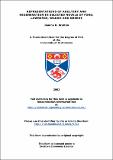Files in this item
Representations of adultery and regeneration in selected novels of Ford, Lawrence, Waugh and Greene
Item metadata
| dc.contributor.advisor | Herbert, Michael | |
| dc.contributor.author | Bratten, Joanna K. | |
| dc.coverage.spatial | 202 | en_US |
| dc.date.accessioned | 2015-06-01T15:43:31Z | |
| dc.date.available | 2015-06-01T15:43:31Z | |
| dc.date.issued | 2002 | |
| dc.identifier | uk.bl.ethos.646390 | |
| dc.identifier.uri | https://hdl.handle.net/10023/6723 | |
| dc.description.abstract | This thesis is an examination of how the themes of adultery and regeneration are interwoven and explored by selected English novelists in the first half of the twentieth century. It is essential to establish that Ford, Lawrence, Waugh and Greene do not adhere to the ‘archetypal’ pattern of the adultery novel established in the nineteenth century and, in fact, turn that pattern on its head. Ford’s The Good Soldier and Parade’s End provide two differing perspectives. The first uses adultery as a metaphor for the disintegration of English society, mirroring the social disintegration that accompanied the First World War; Parade’s End, however, presents an adulterous relationship as being a regenerative force in the post-war society. Lawrence’s Lady Chatterley’s Lover also uses an adulterous relationship as a means of addressing the need for social, and national, regeneration in the inter-war years. Waugh’s A Handful of Dust presents a woman’s adultery as the ruin of not only a good man, but also civilisation in general; Brideshead Revisited is more religious in tone and traces the spiritual regeneration of its central character, whose conversion, ironically, is made possible through his adulterous relationship. Similarly, Greene’s The Heart of the Matter and The End of the Affair portray the process of spiritual regeneration; in both novels this movement towards salvation is intertwined with an exploration of adulterous love. The ultimate question probed in this thesis is how the twentieth century novel of adultery overturns the traditional literary approach to the subject. Adulterous unions and illegitimate children are no longer presented as being exclusively socially destabilising or subversive in these novels; most intriguingly significant is that, in some of these novels, the illegitimate child becomes a symbol of hope, and, indeed, of regeneration. | en_US |
| dc.language.iso | en | en_US |
| dc.publisher | University of St Andrews | |
| dc.subject.lcc | PR888.A37B8 | |
| dc.subject.lcsh | Adultery in literature | en_US |
| dc.subject.lcsh | Regeneration in literature | en_US |
| dc.subject.lcsh | Ford, Ford Madox, 1873-1939 | |
| dc.subject.lcsh | Lawrence, D. H.|q(David Herbert), 1885-1930 | |
| dc.subject.lcsh | Waugh, Evelyn, 1903-1966 | |
| dc.subject.lcsh | Greene, Graham, 1904-1991 | |
| dc.title | Representations of adultery and regeneration in selected novels of Ford, Lawrence, Waugh and Greene | en_US |
| dc.type | Thesis | en_US |
| dc.type.qualificationlevel | Doctoral | en_US |
| dc.type.qualificationname | PhD Doctor of Philosophy | en_US |
| dc.publisher.institution | The University of St Andrews | en_US |
This item appears in the following Collection(s)
Items in the St Andrews Research Repository are protected by copyright, with all rights reserved, unless otherwise indicated.

